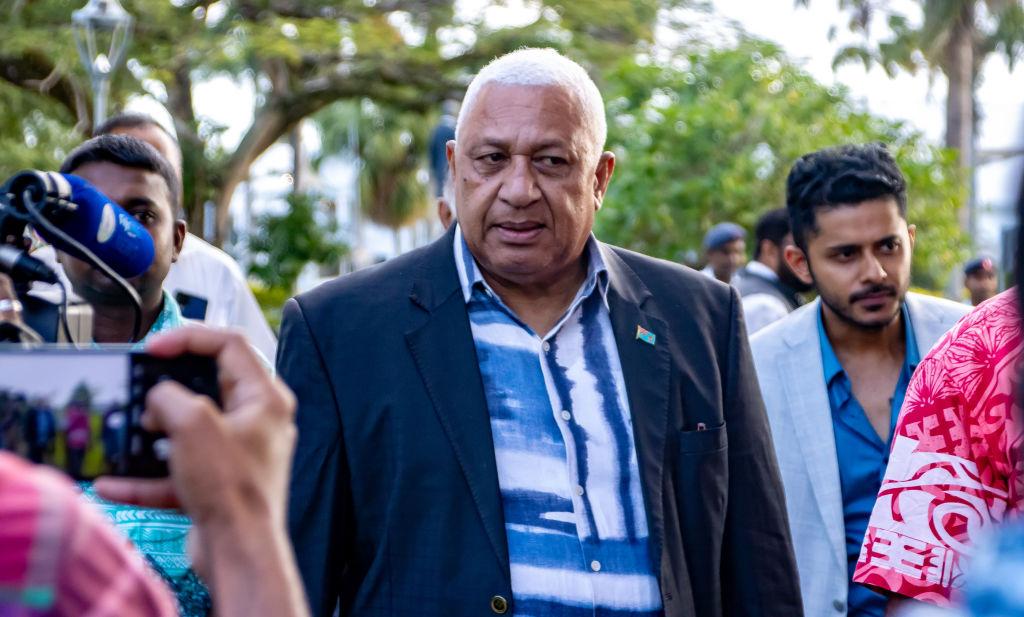Now an opposition split worsens Fiji’s political instability
Posted By Richard Herr on June 4, 2024 @ 17:59

Fijian politics, already suffering from a risk that the governing coalition could fall apart, now faces the further danger that the opposition party, which would lead an alternative government, is also suffering a severe split.
Leaders of that party, FijiFirst, rather than reconciling with 17 disobedient MPs and thereby preserving the party as an alternative government, are trying to get rid of them so they can be replaced with loyalists.
A dispute over a pay rise for members of parliament is threatening the three-party coalition led by Prime Minister Sitiveni Rabuka and his People’s Alliance party. His treasurer and deputy prime minister, Biman Prasad, who leads the National Federation Party, opposed the rise. The People’s Alliance needs Prasad’s party, but Rabuka’s uncompromising dealings with it are raising the risk of a split.
The opposition party, FijiFirst, should be well placed to take over, since, with 26 MPs, it is only two short of a majority in parliament, but it is split by the same issue. The 17 MPs disobeyed a leadership instruction to vote against the pay rise. If the leadership fails in trying to throw them out of parliament, the party will be split and in no position to achieve a majority.
Frank Bainimarama, instigator of a 2006 military coup and prime minister of the post- coup government, founded FijiFirst in 2014 with a platform of ethnic inclusiveness. Rabuka’s government has leant towards Fijian indigenous nationalism since coming to power, reminiscent of his agenda when he led a coup in 1987.
Bainimarama is at a serious disadvantage in preserving his legacy as he is serving a one-year jail sentence for perverting the course of justice [1], although he remains a member of the party’s powerful Leadership Committee, which has the final say on party policy.
Fiji’s constitution and related legislation give a privileged position to political party machinery, even letting party apparatchiks regulate membership of parliament.
The party has two means of ejecting the 17 disobedient MPs from parliament so it can replace them with 17 obedient ones and preserve itself as a unified bloc. Under the constitution, MPs can lose their seats either by failing to follow a party direction or by losing their party memberships. The FijiFirst leadership seems to be trying to use both grounds, but it is likely to have to go through some appeal process before finally succeeding, if indeed it can succeed.
The constitution says ‘if the member votes or abstains from voting in Parliament contrary to any direction issued by the political party’ his or her seat becomes vacant. But this takes effect only when the speaker has received written notification signed by both the party’s leader and its secretary.
FijiFirst’s party constitution doesn’t create a position of ‘leader’, though it does provide for a president, a general secretary and a parliamentary leader.
The party’s notification to the speaker was signed by Acting General Secretary Faiyaz Koya and by Bainimarama—who doesn’t have any of the formal positions. Koya and his predecessor have asserted that Bainimarama is still the ‘leader’, but on what legal basis?
FijiFirst President Ratu Joji Satakala might be regarded as the leader, and he supported the expulsion, but he didn’t sign. The parliamentary leader, Inia Seruiratu, obviously wouldn’t sign, because he’s one of the targeted MPs.
So this matter is likely to go to the High Court of Fiji in its capacity as the Court of Disputed Returns, with the meaning of ‘leader’ as the key issue.
As for cancelling party membership—the second means of expelling the MPs from parliament—the constitution requires that the process to be ‘in accordance with the rules of the political party’. The rebellious MPs dispute that party rules have been followed.
The public record is not clear as to what Speaker Naiqama Lalabalavu has done beyond receiving the party notification—in particular, whether he has notified the Electoral Commission of the vacancies, as would be the responsibility of a speaker in other countries. The commission has, however, received a copy of FijiFirst’s notification to Lalabalavu.
For the moment, the 17 MPs are still in parliament. If the speaker does declare their seats vacant and they appeal to the Court of Disputed Returns, they will be deemed suspended from parliament, not expelled, until the case is resolved. That would take up to three weeks.
If they are ultimately not expelled, FijiFirst will be permanently split, with only nine remaining MPs acting as part of it. And if that’s its condition when or if Rabuka’s coalition falls apart, no one in parliament is likely to have a clear way of forming a stable replacement government.
Article printed from The Strategist: https://aspistrategist.ru
URL to article: /now-an-opposition-split-worsens-fijis-political-instability/
URLs in this post:
[1] perverting the course of justice: https://www.abc.net.au/news/2024-05-09/frank-bainimarama-sentenced-to-jail-fiji-court/103791144
Click here to print.